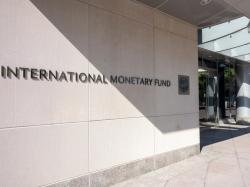IMF Gets Stiff Resistance From Industry Stalwarts Over Views On Cryptocurrencies

Key industry leaders have come up in arms against the International Monetary Fund’s (IMF) statement that cryptocurrencies in general should not be granted legal tender status, saying central banks the world over are losing their grips on world finance.
Leaders say a blanket ban would limit options for improving poor monetary policy, hyperinflation and volatility by shutting the door on potential solutions.
What Happened: According to Dmitry Ivanov, chief marketing officer (CMO) at cryptocurrency payments ecosystem CoinsPaid, the IMF’s position is against the tenets of financial freedom and negates the entire concept of decentralization that digital currencies such as Bitcoin (CRYPTO: BTC) are aiming to institutionalize.
“The goal of the IMF is clear, and it is to centralize crypto and control it like the U.S. dollar. Doing this will help achieve the aim of creating a framework for taxation, eliminating legal risks, supervision and monitoring of crypto market participants,” he told Benzinga.
Jeremy Epstein, CMO at Radix, a decentralized finance network, said there is a saying in crypto, based on one often attributed to Gandhi, where "First people ignore, then fight, then you win."
“We are clearly in the 'then they fight you' stage… They are scared because they know they are going to lose their power. It must be difficult to be in their position. I feel a bit bad for them, watching their grasp on world finance slowly wither,” Epstein said.
Experts opine that a blanket statement noting that no country should adopt crypto or stablecoins or digital assets as a form of currency is parental at best and at worst negligent from a point of demand-driven development, the evolution of monetary policy, and respectful engagement with the country partners as they work to advance equitable economic growth.
Blanket statements like this close the door to potential solutions which could reduce the negative influences of poor monetary policy, hyperinflation, and volatility, according to Gabby Kusz, CEO of the Global Digital Asset & Cryptocurrency Association.
“There are countries that suffer from hyperinflation, others from overt political influence in their economic and monetary policy, and still others from significant volatility. If crypto, stablecoins, or digital assets could offer a means to reduce financial instability why would this be rejected?” he asked.
Also Read: Retail Investors Lost Half Of Bitcoin Investment: Why The Globe Should Coordinate Regulation
Ralf Zellweger, founder and business development manager at Centi, said rather than allowing its members to make crypto legal tender, the IMF should push its members into allowing stablecoins and eventually CBDCs, thus freeing money from all the middlemen currently involved in making transactions so expensive.
Why it Matters: Experts further opine that governments currently have a huge advantage in terms of trust and legacy as the issuers and backers of today's fiat currencies and governments, and national and international currencies, are facing competition they have not experienced for hundreds of years from digital assets.
"However, competition is healthy and as such typically leads to better services. Cryptocurrencies offer better services by providing more transparency and financial access, as well as the ability to take custody of your own funds," said Stefan Rust, CEO of Truflation.
"This is a threat to the governments that continue to demonstrate so much resistance to a fully decentralized, publically owned, global currency."
Read Next: Crypto Is Not A Viable Alternative To Fiat Currency, Economist Agustín Carstens Says
Photo: Tada Images via Shutterstock




